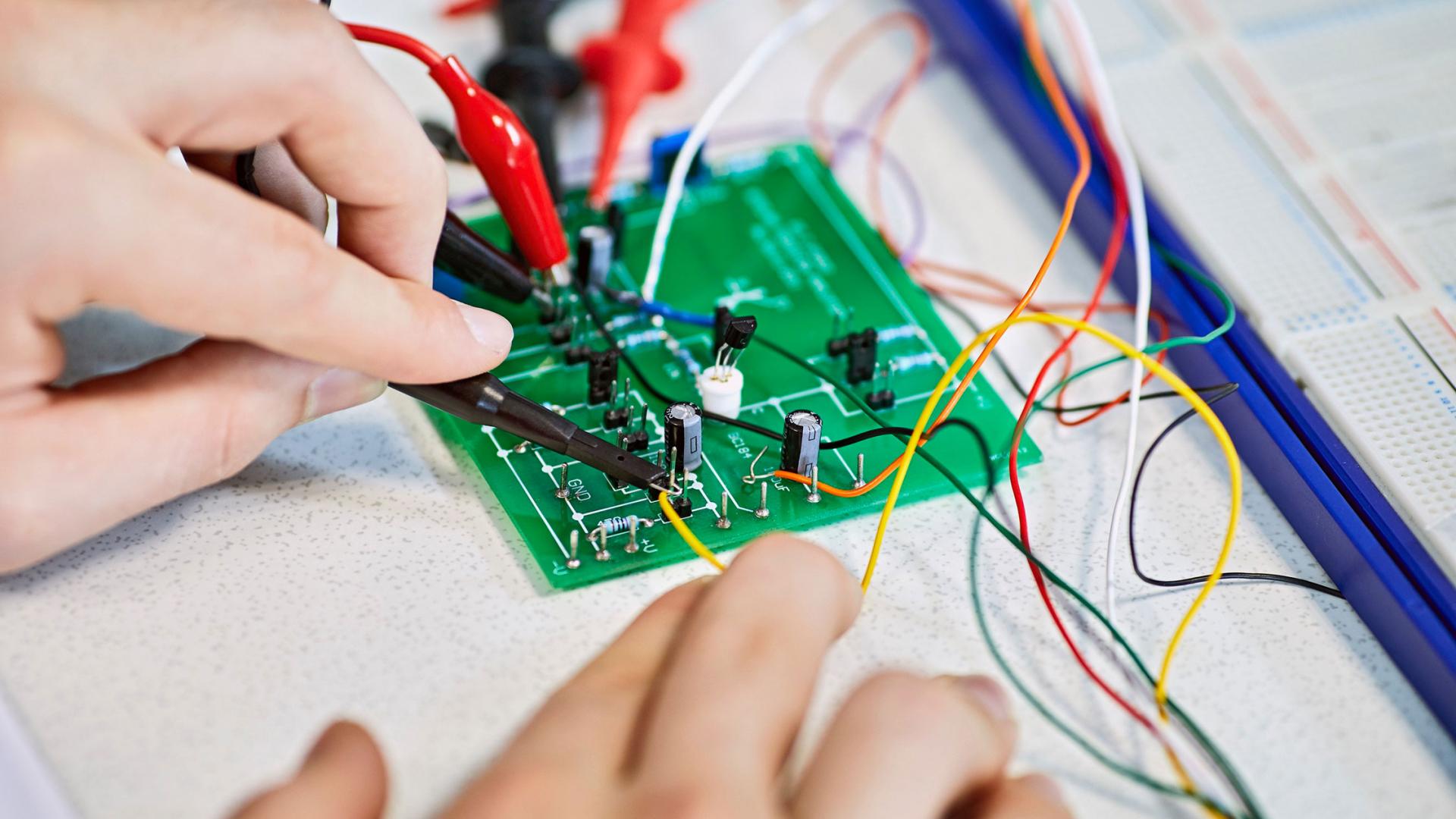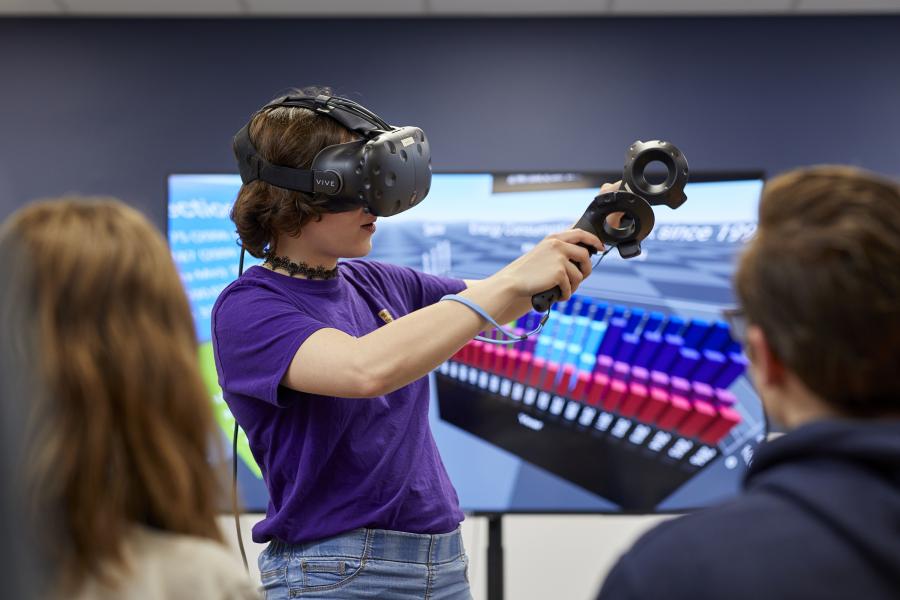About This Course
This BSc Computer Science degree is validated by the British Computer Society which is the Chartered Institute for IT.
BSc Computer Science is designed to provide you with the skills to join a varying range of IT careers, industrial research and development, or further academic study. The individualised pathway (through the use of options) allows you to begin specialising in any theme within Computer Science. Our aim is simple – we want to help you become a computing professional with the ability to keep up to date with the rapid pace of developments in the field.
During this BSc Computer Science course you will learn the fundamentals of computer science and advanced programming skills. You will also benefit from teaching that relates to the research interest of the academic staff. Specialities available during the course include computer graphics, artificial intelligence and agents, and data communications. If these areas appeal to you then this is the BSc Computer Science course for you.
This BSc Computer Science degree will not only equip you with practical skills, but also a deep understanding of the underpinning theory. Graduates from this course join industry in software development, database administration, network administration or similar positions. As a BSc Computer Science graduate, you should be able to obtain a good job in the computing industry in the UK or indeed with any of the international computing firms; or take up study for a higher degree such as a Masters Degree or PhD, both also offered at Bangor.
Why choose Bangor University for BSc Computer Science?
- Our research and other interactions with industry ensure that our courses reflect recent developments. Staff are practising professionals, who work on joint projects and are consultants to industry.
- Final-year BSc Computer Science projects are aligned with current research – providing you with advantages when seeking employment.
- We have recently installed an immersive technologies laboratory, where the latest devices are used for project and research work.
Additional Course Options
This course is available with a Placement Year option where you will study for 1 additional year. The Placement Year is undertaken at the end of the second year and students are away for the whole of the academic year.
The Placement Year provides you with a fantastic opportunity to broaden your horizons and develop valuable skills and contacts through working with a self-sourced organisation relevant to your degree subject. The minimum period in placement (at one or more locations) is seven calendar months; more usually you would spend 10-12 months with a placement provider. You would normally start sometime in the period June to September of your second year and finish between June and September the following year. Placements can be UK-based or overseas and you will work with staff to plan and finalise the placement arrangements.
You will be expected to find and arrange a suitable placement to complement your degree and will be fully supported throughout by a dedicated member of staff at your academic School and the University’s Careers and Employability Services.
You will have the opportunity to fully consider this option when you have started your course at Bangor and can make an application for a transfer onto this pathway at the appropriate time. Read more about the work experience opportunities that may be available to you or, if you have any questions, please get in touch.
This course is available with an International Experience Year option where you will study or work abroad for 1 additional year. You will have ‘with International Experience’ added to your degree title on graduating.
Studying abroad is a great opportunity to see a different way of life, learn about new cultures and broaden your horizons. With international experience of this kind, you’ll really improve your career prospects. There are a wide variety of destinations and partner universities to choose from. If you plan to study in a country where English is not spoken natively, there may be language courses available for you at Bangor and in your host university to improve your language skills.
You will have the opportunity to fully consider this option at any time during your degree at Bangor and make your application. If you have any questions in the meantime, please get in touch.
Read more about the International Experience Year programme and see the studying or working abroad options on the Student Exchanges section of our website.
Course Content
During the BSc Computer Science degree you will spend about 12 hours in lectures and 8 in laboratories each week. You will also have tutorials in some modules and have to work on software design and complete various problem-solving assignments. There will be an opportunity to undertake major software projects which will allow you to develop your creative design and technical skills as well as apply the theoretical principles you have learned.
Modules on the BSc Computer Science degree are assessed by examinations, continuous assessment or a combination of both. The continuous assessment can include some supervised practical element or independent study, followed by report writing. Your module results and individual project marks contribute to your degree final grade.
There will be an opportunity to undertake major software projects in both Year 2 (industry linked) and Year 3 which will allow you to develop your creative design and technical skills as well as apply the theoretical principles you have learnt.
Modules for the current academic year
Module listings are for guide purposes only and are subject to change. Find out what our students are currently studying on the Computer Science BSc (Hons) Modules page.
Course content is for guidance purposes only and may be subject to change.
Facilities
Computer Science facilities
- Large, fully equipped computing laboratories and all the latest software.
- A recently installed immersive technologies laboratory, where the latest devices are used for project and research work.
- A recently installed large networking laboratory to provide students with the opportunity to design and administer networks and for the teaching of computer architecture modules.
Take a 360 virtual tour of our facilities
General University Facilities
Library and Archive Services
Our four libraries provide a range of attractive study environments including collaborative work areas, meeting rooms and silent study spaces.
We have an extensive collection of books and journals and many of the journals are available online in full-text format.
We house one of the largest university-based archives not only in Wales, but also the UK. Allied to the Archives is the Special Collections of rare printed books.
Learning Resources
There is a range of learning resources available, supported by experienced staff, to help you in your studies.
The University’s IT Services provides computing, media and reprographics facilities and services including:
- Over 1,150 computers for students, with some PC rooms open 24 hours a day
- Blackboard, a commercial Virtual Learning Environment, that makes learning materials available on-line.
Course Costs
General University Costs
Home (UK) students
- The cost of a full-time undergraduate course is £9,000 per year (2021/22 entry and 2022/23 entry).
- The fee for all placement, international, and sandwich years is £1,350 (2021/22 and 2022/23).
- More information on fees and finance for Home (UK) students.
International (including EU) students
Additional Costs
There are also some common additional costs that are likely to arise for students on all courses, for example:
- If you choose to study abroad or take the International Experience Year as part of your course.
- If you attend your Graduation Ceremony, there will be a cost for gown hire (£25-£75) and cost for additional guest tickets (c.£12 each).
Course-specific additional costs
Depending on the course you are studying, there may be additional course-specific costs that you will be required to meet. These fall into three categories:
- Mandatory Costs: these are related to a particular core or compulsory module that you’ll be required to complete to achieve your qualification e.g. compulsory field trips, uniforms for students on placement, DBS Check.
- Necessarily Incurred Costs: these may not be experienced by all students, and will vary depending on the course e.g. professional body membership, travel to placements, specialist software, personal safety equipment.
- Optional Costs: these depend on your choice of modules or activity and they are shown to give you an indication of the optional costs that may arise to make sure your choice is as informed as possible. These can include graduation events for your course, optional field trips, Welcome Week trips.
Entry Requirements
GCSE: grade C/4 in Maths (if the Level 3 qualification does not include Maths or Science study)
Offers are tariff based, 120 - 128 tariff points from a Level 3 qualification e.g.:
- A-levels: Including a Science/Maths/ Computing/IT subject.* General Studies and Key Skills not normally accepted.
- BTEC National Extended Diploma in a relevant subject: DDM
- Cambridge Technical Extended Diploma in a relevant subject: DDM
- City & Guilds Advanced Technical Extended Diploma (1080): considered on a case-by-case basis
- International Baccalaureate Diploma in a relevant subject (Science / Maths/ Computing/ IT)*
- Welsh Baccalaureate is accepted
- Access to HE in a relevant subject (Science/Maths/ Computing/IT)*
- T-levels: considered on a case-by-case basis.
We also welcome applications from mature applicants.
*Other subject areas may be considered on a case-by-case basis
For full details go to our website and for a full list of accepted Level 3 qualifications, go to www.ucas.com
International Candidates: school leaving qualifications and college diplomas are accepted from countries worldwide (subject to minimum English Language requirements). More information here.
General University Requirements
To study for a degree, you’ll be asked for a minimum of UCAS Tariff points. For a fuller explanation of the UCAS Tariff Points, please see www.ucas.com.
We accept students with a wide range of qualifications and backgrounds and consider each application individually.
All students need to have good basic skills and the University also values IT and communication skills.
As part of the University’s policy, we consider applications from prospective disabled students on the same grounds as all other students.
We also consider applications from mature students who can demonstrate the motivation and commitment to study a university programme. Each year we enrol a significant number of mature students. For more information about studying as a mature student, see our Studying at Bangor section of the website.
EU and International Students' Entry Requirements
For detailed guidance on the entry requirements for EU and International Students, including the minimum English Language entry requirement, please visit the Entry Requirements by Country pages. International applicants can also visit the International Education Centre section of our website for further details.
Bangor University offers International Incorporated Bachelor Degrees for International students whose High School qualification is not equivalent to the UK school leaving qualification. The first year (or Year 0) is studied at Bangor University International College, an embedded College on our University campus and delivered by Oxford International Education Group.
Careers
This BSc Computer Science degree will prepare you for a variety of careers in web application development, software engineering, programming, communications and networking, computer applications, IT management, computer sales and marketing.
Opportunities at Bangor
The University’s Careers and Employability Service provides a wide range of resources to help you achieve your graduate ambitions.
The Bangor Employability Award (BEA)
The BEA is a comprehensive online course that you can work through at your own pace, taking you through all the steps you need to take to explore, prepare and apply for your dream career.
Internships
Bangor University runs a paid internship scheme within the university’s academic and service departments.
Student Volunteering
Volunteering widens your experience and improves your employability. Find out more about volunteering on the Students’ Union’s website.
Foundation Year
A 'with Foundation Year' option is available for this course. Apply for Computer Science (with Foundation Year).




